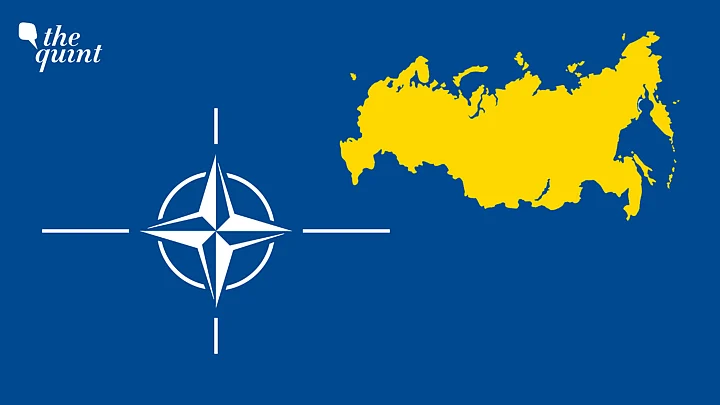As the chances of a long-drawn, painful war of attrition on European mainland becomes increasingly likely with each passing day, one needs to point out that the Western policy elites had always known that the inclusion of Ukraine into NATO was a red line whose crossing would cause a ‘neuralgic and concrete’ response from Russia.
Dwight D Eisenhower, NATO’s first supreme allied commander, wanted to wrap up the western military alliance by 1961. On assuming office in 1951, he had remarked:
“If in 10 years, all American troops stationed in Europe for national defense purposes have not been returned to the US, then this whole project [NATO] will have failed.”
In August 1948, the US National Security Council issued a memorandum (NSC 20/1 1948) describing American objectives in the USSR and a significant part of it dealt with Ukraine.
One can see that the Americans have always understood the dangers inherent in taking Ukraine away from the Russian orbit. The report read,
“The economy of the Ukraine is inextricably intertwined with that of Russia as a whole … To attempt to carve it out of the Russian economy and to set it up as something separate would be as artificial and as destructive as an attempt to separate the Corn Belt, including the Great Lakes industrial area, from the economy of the United States… Finally, we cannot be indifferent to the feelings of the Great Russians themselves … They will continue to be the strongest national element in that general area, under any status … The Ukrainian territory is as much a part of their national heritage as the Middle West is of ours, and they are conscious of that fact. A solution which attempts to separate the Ukraine entirely from the rest of Russia is bound to incur their resentment and opposition, and can be maintained, in the last analysis, only by force.”
'Most Fateful Error of American Policy'
After the Soviet disintegrated, there was an assurance (albeit oral) given by the West to Russia: “not an inch eastward,” the US Secretary of State James Baker had said to Mikhail Gorbachev on 9 February 1990.
In the mid 1990’s, when the Clinton administration decided to expand NATO, the Russians under President Yeltsin made it clear that it was unacceptable to them.
America’s foremost Russia hand and the brain behind its Cold War containment policy George Kennan, writing in 1997, had called NATO’s eastward expansion as “the most fateful error of American policy in the entire post-Cold War era. Such a decision might be expected… to impel Russian foreign policy in directions decidedly not to our liking.”
'NATO Aspirations Touch A Raw Nerve In Russia'
The West did it anyway first in 1999, and then in 2004. And then came the Bucharest Summit in 2008, where the US, in its unilateral moment, obstinately declared its intention to expand NATO to Georgia and Ukraine despite dissenting voices from important allies like France and Germany.
On the other hand, American high officials themselves were issuing dire warnings. The former CIA Director and the-then US Ambassador to Moscow William J Burns wrote in a private cable titled Nyet Means Nyet: Russia’s NATO Enlargement Redlines, later released by Wikileaks:
“Ukraine and Georgia’s NATO aspirations not only touch a raw nerve in Russia, they engender serious concerns about the consequences for stability in the region. Not only does Russia perceive encirclement, and efforts to undermine Russia’s influence in the region, but it also fears unpredictable and uncontrolled consequences which would seriously affect Russian security interests."
He went on to add,
"Experts tell us that Russia is particularly worried that the strong divisions in Ukraine over NATO membership, with much of the ethnic-Russian community against membership, could lead to a major split, involving violence or at worst, civil war. In that eventuality, Russia would have to decide whether to intervene; a decision Russia does not want to have to face.”
John Mearshimer, the most prominent realist scholar has pointed out the stupidity of further NATO expansion for the above reasons and also highlighted the West’s crucial need for having Russia on its side in balancing off a rising and assertive China.
The German navy chief Kay-Achim Schonbach made a similar observation in January last year. Besides, he added that all that Russia is looking for is respect, thereby, implying that the West should stay away from its backyard.
So the question arises: Despite knowing well the dire repercussions of NATO’s continuous eastward expansion, why does the West insist on it?
Perhaps NATO, as an institution having acquired a life and agency of its own, creates situations that justify its existence.
Or perhaps, the Russians rightly fear that the West, after arriving in their backyard would ultimately want to manufacture a colour revolution in Russia like it has done in other former Soviet Republics.
(Pushpak Roy holds an MPhil in IR and is currently a PhD candidate at the School of International Studies, JNU. This is an opinion piece and the views expressed are the author’s own. The Quint neither endorses nor is responsible for them.)
